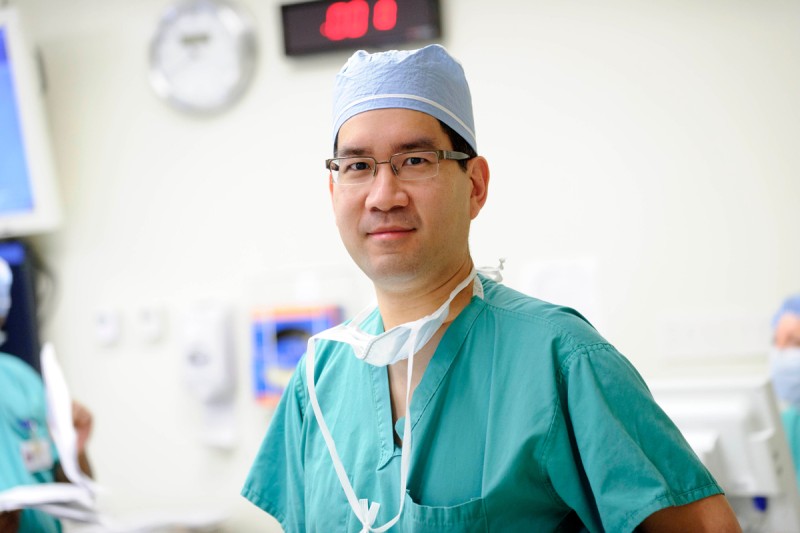
Richard Wong is Chief of MSK’s Head and Neck Service.
In recognition of Head and Neck Cancer Awareness Month, we asked Richard Wong, Chief of the Head and Neck Service, to discuss his team’s approach to patient care.
What makes the care your team offers for head and neck cancers stand out?
Learn more about surgery options for thyroid cancer patients
It all starts with making sure that we have a correct diagnosis. To do this, we rely on our pathologists to conduct a careful analysis of a tumor’s genetics. Once a diagnosis is made, we do imaging tests that are interpreted by our neuroradiology and ultrasonography experts to carefully assess the extent and possible spread of the tumor.
All of this information is analyzed by our team of experts from different areas, who all specifically focus on head and neck and thyroid cancers. This group, which includes surgeons, medical oncologists, radiation oncologists, and endocrinologists, meets to discuss the usefulness of every treatment approach. In some cases, we may decide that the best treatment is to monitor a particular tumor rather than intervene right away. This approach is known as active surveillance. We have a robust active surveillance program for low-risk thyroid cancers.
If a person needs surgery for any type of head and neck cancer, our specialists are experienced in minimally invasive methods, including robot-assisted surgery. We also take innovative surgical approaches to treat tumors. For example, we may reach tumors in the pituitary gland or at the skull base through the nasal cavity using scopes. For cancers of the larynx (the voice box), our surgeons can use laser microsurgery to remove tumors through the mouth.
We also offer other advanced treatments. For example, our radiation oncologists use proton therapy to destroy head and neck tumors with great precision, and with minimal impact to nearby healthy organs and tissues. Our medical oncologists employ targeted therapies to block the effects of a tumor’s genetic mutations and are leading the way in the development of new drugs that rally the immune system to fight cancer.
How does quality of life factor into a treatment plan?
We place a premium on preserving a person’s quality of life — and we understand that any treatment could affect a person’s appearance, speech, and ability to swallow, taste, or hear.
To give one prominent example, there has been a striking increase in head and neck cancers related to human papillomavirus (HPV) infection in younger people. The good news is that they usually have an excellent prognosis, but it’s especially important to be mindful of the long-term impacts of treatment. Previously, these cancers were treated using combinations of surgery, radiation, and chemotherapy. The process is called trimodality therapy. Today at MSK, we create an individualized treatment plan for each person, and it’s led to a reduction in the intensity of therapy for many. At MSK, only 8% of people with throat cancer now receive trimodality therapy, compared with 41% at other North American institutions.
We are in the process of implementing an online questionnaire called FACE-Q to help us learn more about the experiences of our patients before, during, and after treatment. With FACE-Q, we can measure more than whether the treatment worked. We can know how our patients feel, if they were they pleased with the results, and about any side effects they experienced.
How does your team help ease the recovery process?
We have extremely knowledgeable speech and swallowing therapists, physical and occupational therapists, and dermatology experts to help patients during and after treatment. Our talented plastic and reconstructive surgeons can preserve form and function using the latest techniques. These methods include free tissue transfer, in which a plastic surgeon transfers a piece of the patient’s own tissue from a different location to the area where the cancer was removed. Our plastic surgeons can also restore facial appearance and movement that may have been lost as a result of cancer progression or treatment.
What research in head and neck cancer are you most excited about right now?
There are a number of exciting developments that should give us even more options to treat head and neck cancers more effectively and provide people with the best possible quality of life. One especially promising area is immunotherapy, which has become an effective option for some people with head and neck cancer. One class of immunotherapies, checkpoint inhibitor drugs, is already making an impact. In 2016 alone, the FDA approved two checkpoint inhibitors, nivolmab (Opdivo®) and pembrolizumab (Keytruda®), for squamous cell head and neck cancer.
In surgery, we are trying to improve the methods that allow us to visualize tumors during an operation. Better images give us confidence that we are removing all the cancerous tissue. We’re also refining our robotic and laser surgery techniques to be even less invasive and allow people to recover more easily.
Genomic research is playing an increasingly important role. With a tool like MSK-IMPACT™, we can build on our personalized approach and can match individual patients with therapies that will work better and cause fewer side effects.
Of course, the key to bringing new research advances into clinical practice is showing that they work in clinical trials. MSK-IMPACT™ also helps us develop new drugs to help patients in the future.




